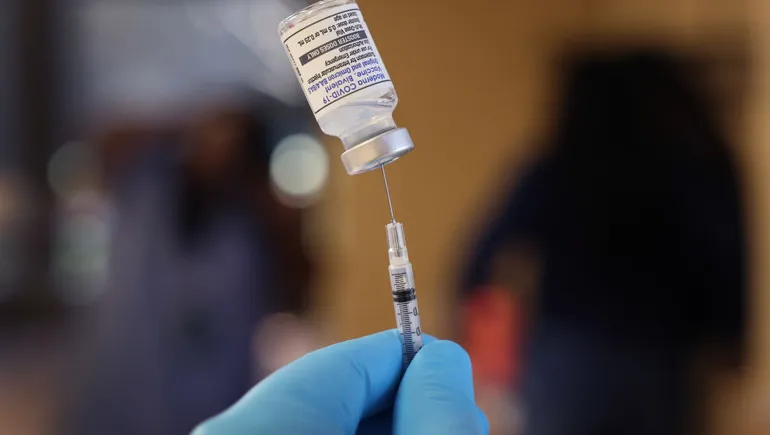COVID vaccine giants Moderna and Pfizer employ divergent tactics for the next chapter

$17.7 billion
Moderna’s Spikevax sales in 2021.
Apples to oranges
While not a perfect comparison, Moderna and Pfizer have diverging growth strategies coming out of the COVID vaccine sales slump, with Pfizer focusing on leveraging cash on hand for a big acquisition and Moderna going all in with advancing its mRNA pipeline.
Reading the writing on the wall alongside a COVID vaccine and antiviral sales crash, Pfizer acquired cancer drugmaker Seagen for $43 billion. The acquisition is a push for its oncology business and was the biggest pharma deal of 2023, which CEO Albert Bourla touted as a regulatory success amid the FTC’s tighter M&A strictures.
Pfizer’s COVID vaccine crash
$36.8 billion
Pfizer’s Comirnaty sales in 2021.
$37.8 billion
Comirnaty sales in 2022.
$11.2 billion
Comirnaty sales in 2023.
The acquisition was a bet on antibody-drug conjugates, which are garnering attention in pharma as high-value cancer drugs.
“From Seagen, we expect to get $10 billion by the year 2030,” Bourla said during the company’s earnings call. “A few things that have reinforced our confidence in this number have occurred: The first one is that ADC became the hottest thing in M&A activity — everybody wants an ADC, [and] our big bet was in this technology.”
Zooming out, 2024 may be a big year for M&A activity from Big Pharma, with particular focus on oncology and immunology deals, according to a yearly outlook from PwC.
Meanwhile, Moderna is focusing on its own pipeline. Yet, time will tell how well this strategy pays off.
“We focused our R&D spending and our SG&A expenditures towards near-term growth and higher return on investment projects,” Stephane Bancel, Moderna’s CEO, said during the company’s end-of-year earnings call. “While sales were challenging in 2023, our development team had a great year, with excellent progress across many of our late-stage pipeline programs. In 2023, we advanced our pipeline and now have nine late-stage programs.”
Nestled in the pipeline is the company’s cancer vaccine, which makes use of its individualized neoantigen therapy (INT) technology. With studies alongside partner Merck & Co. for melanoma and lung cancer ongoing, sought-after treatments are still a long way off from the market.
“There are clearly signs of the potential of the mRNA platform which was proven out through the vaccine success that they’ve had over the last couple years,” Michael Yee, senior biotech analyst at Jefferies, told CNBC at the end of 2023. “And Merck obviously took a look at that and said, ‘super promising,’ paid a lot of money and is pouring billions of dollars into the lung cancer study. If you take a look at Moderna, it’s going to take a couple years for that to play out as the study is basically rolling.”
Source link
#COVID #vaccine #giants #Moderna #Pfizer #employ #divergent #tactics #chapter